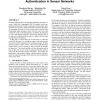Free Online Productivity Tools
i2Speak
i2Symbol
i2OCR
iTex2Img
iWeb2Print
iWeb2Shot
i2Type
iPdf2Split
iPdf2Merge
i2Bopomofo
i2Arabic
i2Style
i2Image
i2PDF
iLatex2Rtf
Sci2ools
113
click to vote
MOBIHOC
2007
ACM
2007
ACM
Containing denial-of-service attacks in broadcast authentication in sensor networks
Broadcast authentication is an important application in sensor networks. Public Key Cryptography (PKC) is desirable for this application, but due to the resource constraints on sensor nodes, these operations are expensive, which means sensor networks using PKC are susceptible to Denial of Service (DoS) attacks: attackers keep broadcasting bogus messages, which will incur extra costs, thus exhaust the energy of the honest nodes. In addition, the long time to verify each message using PKC increases the response time of the nodes; it is impractical for the nodes to validate each incoming message before forwarding it. In this paper we discuss this type of DoS attacks, in which the goal of the adversary is to exhaust the energy of the sensor nodes and to increase their response time to broadcast messages. We then present a dynamic window scheme, where sensor nodes determine whether first to verify a message or first to forward the message by themselves. This is made possible with the infor...
Related Content
| Added | 24 Dec 2009 |
| Updated | 24 Dec 2009 |
| Type | Conference |
| Year | 2007 |
| Where | MOBIHOC |
| Authors | Ronghua Wang, Wenliang Du, Peng Ning |
Comments (0)

